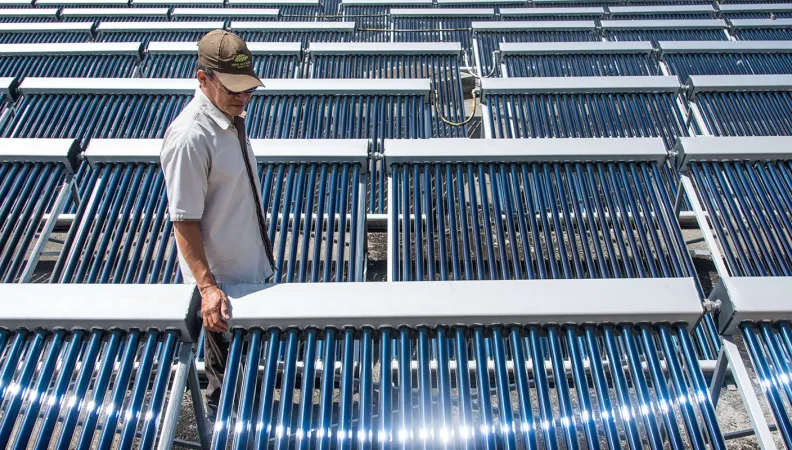Share the page
Just Energy Transition (JET)

The notion of a just transition stems from the realization that there is a link between crises that are environmental or social in nature. It takes into account the interests of workers and vulnerable people in the processes of decarbonizing economies, so that the transition to decarbonized energy sources is not a barrier to an increase in people’s well-being. To promote an inclusive, equitable, and sustainable energy transition, AFD Group mobilizes its full range of financial tools and works in partnership with local stakeholders including central governments, public and private companies, financial institutions, non-governmental organizations (NGOs), and civil society.
Partnerships
To meet the challenges of a just energy transition, AFD Group is multiplying various kinds of partnerships and is making significant use of delegated funds, in particular from the European Union and the Green Climate Fund.
Since 2021, AFD has been implementing France’s commitments under the Just Energy Transition Partnership (JETP) initiative. Thanks to financial coalitions that have far-reaching goals, the JETP initiative supports partner-country governments in accelerating the decarbonization of their economies, including control over its social effects. AFD is a stakeholder in the first four JETPs, which have been signed with South Africa, Indonesia, Vietnam, and Senegal.
To fuel reflection and initiate solutions in a situation of climate emergency, AFD is also mobilizing new types of stakeholders, particularly from the international philanthropy sector, such as the Energy Transition Partnership and, more recently, the Global Energy Alliance for People and Planet.
Focus on three recent projects with a just approach to the energy transition
South Africa – conversion of Eskom coal-fired power stations and JET capacity building
AFD helped finance a cost-benefit analysis of the conversion options for Eskom’s coal-fired power plants, with a strong emphasis on social benefits for local populations. A study was also carried out on the local industrial and job-creation potential for photovoltaic and storage value chains. We also took part in the creation of the “JET Labour Centre,” a research and capacity-building center to support South African labor unions by helping them understand the social aspects of the energy transition and how they can become involved in it. At the same time, our financing is bolstering the ESKOM training center of excellence on “JET trades.”
Albania – Support for proactive public policies
In Albania, through the combination of a public policy loan (PPL) and a grant, AFD helped improve the sustainability of the electricity sector by supporting sector reform and diversification of the electricity mix to include renewable energies. Modelling tools and a study on the impact of the reform on vulnerable people helped support decision-makers in implementing the reform and in working on its acceptability.
Morocco – a project dedicated to training in the energy transition sectors
In Morocco, AFD, alongside the European Union and GIZ, helped finance three “Training Institutes for Renewable Energy and Energy Efficiency” in Oujda, Ouarzazate, and Tangier, in collaboration with the Ministry of Education, Vocational Training, Higher Education and Scientific Research. The aim of the project was to meet the training needs in the renewable-energy and energy-efficiency sector, while at the same time promoting the development of this sector by boosting the qualification of its human resources.
AFD Group’s energy strategy is rounded out by a Just Energy Transition offer, which is in line with our three major commitments “100% SDG quality and consistency”, “respect and dialog,” and “mobilization.” Its aim is to promote a shift, when appropriate, from support for energy transition to support for a just energy transition.
This approach, which is initiated at the planning stage by encouraging inclusive governance, must take into account the interests of all stakeholders. These include vulnerable people, labor unions, civil society, the private sector, and others. This phase is used to i) identify the barriers and success factors of the sought-after transformations, ii) determine the nature of their positive and negative impacts, and iii) estimate how those impacts affect societal segments differently. Based on the findings, we develop and then adjust scenarios to maximize the benefits for the most vulnerable people.
The resulting analysis can then be incorporated into proactive and protective public policies that include:
- redirection of public spending initially linked to fossil fuels, so that it promotes renewable energy;
- fair financing of the national transition effort; and
- introduction of social protection mechanisms and affordable pricing for all.
We offer financial solutions that are adjusted to support workers and households suffering from the decline of sectors affected by the transition. This financing helps lead to the emergence of new sectors locally that can meet the challenges of the transition, thus ensuring the creation of decent jobs and the strengthening of the industrial fabric of our partner countries. This support is based on a global vision of the areas impacted, so that everyone can benefit from this reconversion.
